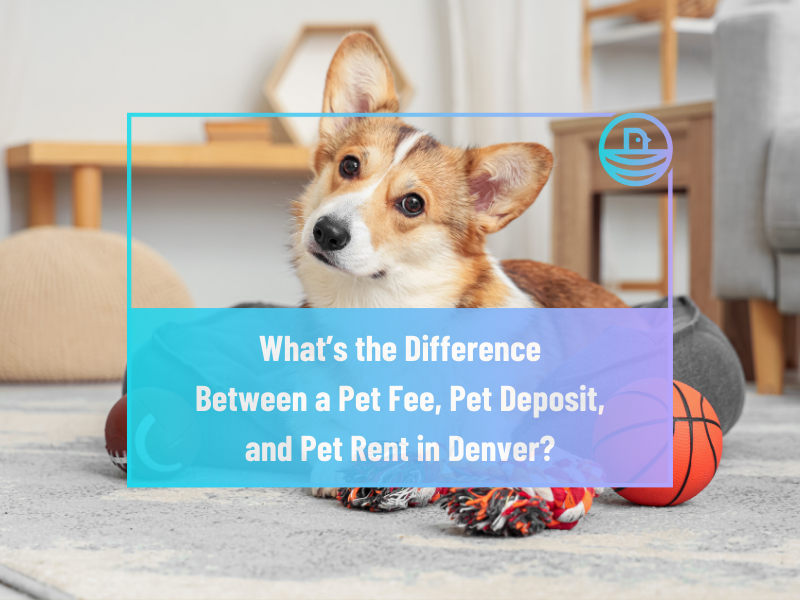Denver is known as an extremely pet-friendly city, with its abundance of spacious dog parks and restaurants and breweries that welcome pets. In fact, local publication Denverite discovered that the Mile High City had more dogs than children, highlighting the important place furry friends hold in the hearts — and homes — of Denver residents.
With Colorado ranking among the country’s top 10 most pet-friendly states, there’s increasing demand for pet-friendly rentals in Denver, but renting with pets can be more complicated than it sounds. It’s important for both landlords and tenants to understand the intricacies of possible pet-related charges to ensure transparency and prevent any disputes down the road.
There are several ways a landlord might decide to charge a tenant for the presence of a pet, including a pet fee, pet deposit or pet rent.
But that brings up a big question: What’s the difference between a pet fee, pet deposit, and pet rent?
In this article, we will break down each one and compare them. We will also discuss how the law affects pet-related charges in Denver.
Read on to learn more and ensure your experience as a landlord or tenant of a pet-friendly rental is purr-fect!
What is a Pet Fee?
Definition: A one-time, nonrefundable fee tenants pay to have a pet in their rental.
Purpose: Compensates landlords up-front for the anticipated wear and tear pets may cause.
Landlord Benefits: Immediate compensation, simplifies accounting.
Tenant Considerations: This is nonrefundable, even if no damage occurs.
Across the country, pet fees can range from $250 to $500 per pet.
What is a Pet Deposit?
Definition: A refundable deposit intended specifically to cover potential pet-related damages.
Purpose: Held by the landlord and returned at the lease’s end if no excessive damage is found.
Landlord Benefits: Acts as a financial safety net for unforeseen damages.
Tenant Considerations: Tenants can get this back if the unit is left in good condition.
Pet deposits can range from $100 to $600 nationwide, although some places (including Colorado) have laws that restrict how much landlords can charge. We’ll get into that more down below.
What is Pet Rent?
Definition: A monthly fee added to rent for the ongoing presence of a pet.
Purpose: Helps landlords offset continuous wear and tear or maintain pet-friendly amenities like dog parks or waste stations.
Landlord Benefits: Provides a consistent revenue stream.
Tenant Considerations: Adds to the monthly housing cost — it’s worth calculating the total cost over a lease term.
Pet rent can range from $10 to $60 per month across the U.S., but Colorado law caps the amount landlords can legally charge. Read on to learn more about legal considerations for pet-friendly rentals in Denver.
What’s the Difference Between a Pet Fee, Pet Deposit and Pet Rent?
.png)
Pet fees, pet deposits and pet rent are all ways tenants might be asked to compensate a landlord for the presence of a pet, but they have several key differences:
A pet deposit is refundable, while pet fees and pet rent are nonrefundable.
Pet fees and pet deposits are one-time charges, while pet rent is an ongoing addition to a tenant’s monthly rent.
Each has a different purpose: Pet fees are intended to provide upfront compensation to the landlord, while pet rent offsets ongoing wear and tear. A pet deposit covers potential damage.
Depending on the property type, the local rental market and renter demand, landlords may choose to implement one or more of these options. A rental property that allows pets may be more attractive to potential renters, and how much landlords charge for it hinges on their overall strategy.
It’s important for renters who have pets to consider their housing budgets with potential pet-related charges in mind. These costs can quickly accumulate, increasing a renter’s monthly payments and affecting which properties they might be able to afford.
Legal Considerations for Denver Landlords and Tenants
Landlords and tenants in Denver should know about a new Colorado law that went into effect Jan. 1, 2024, limiting the amount landlords can charge for pet deposits or pet rent. Pet deposits can’t exceed a refundable $300 (in addition to any other security deposits), and pet rent is capped at $35 per month or 1.5% of the tenant's monthly rent, whichever is greater. Denver doesn’t place any additional restrictions on pet-related charges.
It’s also important to note that service animals and emotional support animals (ESAs) are exempt from any pet-related charges under federal and state law.
Regardless of how a landlord decides to charge their tenants for the presence of a pet, transparency is key. To protect both the landlord and the tenant, all pet-related policies, fees, deposits and rent should be clearly detailed in any lease agreements.
Tips for Landlords in Denver
If you’re weighing whether to allow pets in your rental, it’s important to think through your pet-related policies — and how they will affect both yourself and your tenant.
Before setting a rate for any pet-related charges, you should analyze your rental property — and the Denver market — to determine a fair and competitive price. Denver’s rental market is considered warm, according to Zillow, which leaves some room for you to set a fair price that covers any potential charges you may incur due to the presence of pets. Ultimately, you should calculate your rates based on rental demand. In a cooler market, you might need to drop the pet rent or deposit to entice potential tenants.
You will also need to decide whether to charge a fee, deposit or rent. These options aren’t mutually exclusive — some landlords might charge a pet deposit as well as monthly pet rent. It all depends on your strategy and the Denver rental market.
Many landlords also set pet policies outlining the size, breed or number of pets they’re willing to allow. You might decide that you’re willing to allow cats, but not rabbits or rodents. As long as you’re following state and federal laws related to service animals and ESAs, that’s your decision to make.
Tips for Tenants in Denver
As a renter with pets, there are several important questions you should ask before signing a new lease. First, make sure you understand exactly what the landlord will be charging: Asking for a summary of the pet-related charges they require annually — including any pet fees, a pet deposit or pet rent — will give you a complete picture of what you will be paying, allowing you to budget accordingly. You should also ask about the landlord’s refund policies.
Once you know how much you will be paying to live in a pet-friendly rental, you can create a budget to accommodate those charges, keeping in mind that experts recommend not spending more than 30% of your monthly income on housing.
Depending on your pet’s species and breed, you might also want to develop a plan for preventing property damage so you don’t lose your pet deposit. If you suspect your pet could scratch floors, chew on fixtures or have accidents in the home, it’s important to work on preventing that behavior to avoid damage — or you might have an unwelcome surprise when your lease is up.
Wrapping Up: What’s The Difference Between a Pet Fee, Pet Deposit and Pet Rent?
So, let’s settle this once and for all: What’s the difference between a pet fee, pet deposit, and pet rent?
It’s important for landlords and tenants alike to understand the nuances of pet-related charges, which can vary from a refundable pet deposit to a one-time, nonrefundable pet fee or monthly, nonrefundable pet rent. When both parties understand the terms up-front, they’re able to avoid surprises, foster a better landlord-tenant relationship, and navigate rental listings and lease agreements with ease. Open communication between landlords and tenants helps ensure a positive rental experience.
If you’re a landlord interested in allowing pets in your rental, Evernest’s professional property managers can help. Evernest takes care of the entire process, eliminating the hassle of collecting regular pet rent or resolving any pet-related questions, including “what’s the difference between a pet fee, pet deposit, and pet rent?” Contact us today to learn more!


